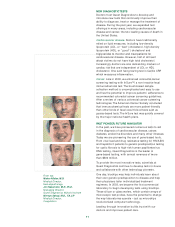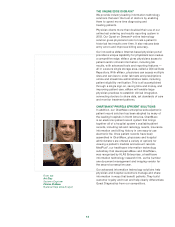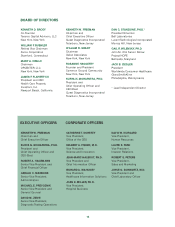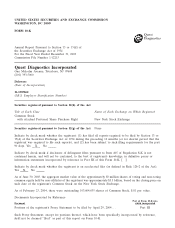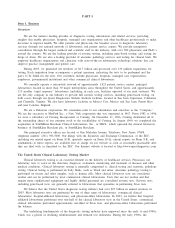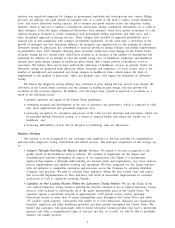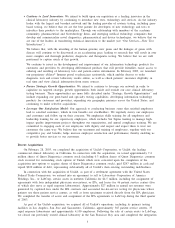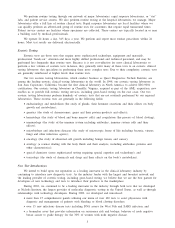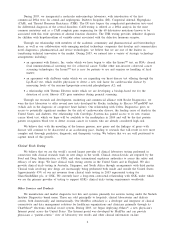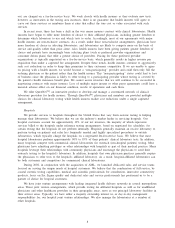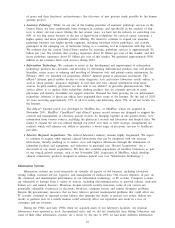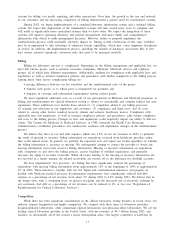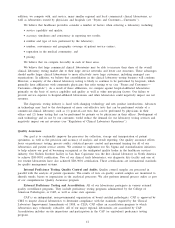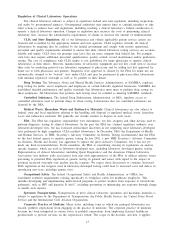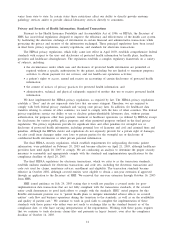Quest Diagnostics 2003 Annual Report Download - page 21
Download and view the complete annual report
Please find page 21 of the 2003 Quest Diagnostics annual report below. You can navigate through the pages in the report by either clicking on the pages listed below, or by using the keyword search tool below to find specific information within the annual report.of remaining customers in the northern California area to Unilab’s laboratories in San Jose and Sacramento. We
continue to have two laboratories in the Los Angeles metropolitan area (our facilities in Van Nuys and
Tarzana). We plan to open a new regional laboratory in the Los Angeles metropolitan area and then integrate
our business in the Los Angeles metropolitan area into the new facility. We expect to incur up to $20 million
of costs through 2005 to integrate Unilab and our existing California operations. Upon completion of the Unilab
integration, we expect to realize approximately $25 million to $30 million of annual synergies. We expect to
achieve this annual rate of synergies by the end of 2005.
On April 1, 2002, we acquired American Medical Laboratories, Incorporated, or AML, and an affiliated
company of AML, LabPortal, Inc., a provider of electronic connectivity products, in an all-cash transaction
valued at approximately $500 million, which included the assumption of approximately $160 million in debt.
AML was a national provider of esoteric testing to hospitals and specialty physicians and a leading provider of
diagnostic testing services in the Nevada and metropolitan Washington, D.C. markets. The Company’s Chantilly,
Virginia laboratory, acquired as part of the AML acquisition, has become our primary esoteric testing laboratory
and hospital service center for the eastern United States, complementing our Nichols Institute esoteric testing
facility in San Juan Capistrano, California. Esoteric testing volumes have been redirected within our national
network to provide customers with improved turnaround time and customer service. We have completed the
transition of certain routine clinical laboratory testing previously performed in the Chantilly, Virginia laboratory
to other testing facilities within our regional laboratory network.
Following an acquisition, the integration process requires the dedication of significant management
resources, which could result in a loss of momentum in the activities of our business and may cause an
interruption of, or deterioration in, our services as a result of the following difficulties, among others:
•a loss of key customers or employees;
•inconsistencies in standards, controls, procedures and policies between the acquired company and our
existing operations may make it more difficult to implement and harmonize company-wide financial,
accounting, billing, information and other systems;
•failure to maintain the quality of services that the Company has historically provided;
•diversion of management’s attention from the day-to-day business of our Company as a result of the
need to deal with the foregoing disruptions and difficulties; and
•the added costs of dealing with such disruptions.
Since most of our clinical laboratory testing is performed under arrangements that are terminable at will or
on short notice, any interruption of, or deterioration in, our services may also result in a customer’s decision to
stop using us for clinical laboratory testing. These events could have a material adverse impact on our business.
However, management believes that the successful implementation of our integration plans and our value
proposition based on expanded patient access, our broad testing capabilities and most importantly, the quality of
the services we provide, will mitigate customer attrition.
Our Services
Our laboratory testing business consists of routine testing, esoteric testing, and clinical trials testing.
Routine testing generates approximately 80% of our net revenues, esoteric and gene-based testing generates
approximately 16% of our net revenues, and clinical trials testing generates less than 3% of our net revenues.
We derive less than 2% of our net revenues from foreign operations.
Routine Testing
Routine tests measure various important bodily health parameters such as the functions of the kidney, heart,
liver, thyroid and other organs. Commonly ordered tests include:
•blood cholesterol level tests;
•complete blood cell counts;
•Pap tests;
•HIV-related tests;
•urinalyses;
•pregnancy and other prenatal tests; and
•alcohol and other substance-abuse tests.
4




